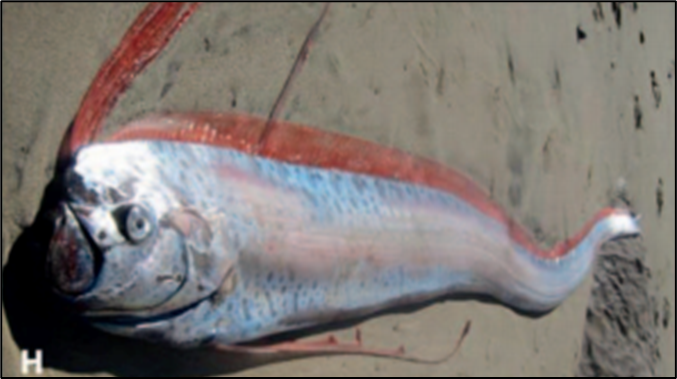Ryugu No Tsukai: “The Messenger From The Sea Dragon Gods Palace”
Recently in the Cozumel Island in Mexico, a group of fisherman found the lifeless body of an oarfish floating on surface waters. The presence of this unusual fish brought unrest among some villagers, as these creatures are believed to be bad omens. But are they really harbingers of natural disasters? A group of Japanese scientists conducted a study to determine if the presence of oarfish coincides with earthquakes. If so, oarfish sightings could be used as predictors in earthquake warning systems. In other words, is the legend true?
A Tale of a Rare Fish
Oarfish are elongated, silvery, scaleless, ray-finned deep-sea fish that belong to the family of Regalecidae and primarily feed on zooplankton. They have a dorsal reddish fin that runs along the length of their body, making them resemble a sea serpent. Oarfish are the longest living species of bony fish and they can reach a length of up to 11 meters. They are rarely seen in the surface and it is thought that they dwell in depths from 200m up to 1000m. Because of the few sightings in their habitat, little is known about this creature. Most specimens that are found, in the surface waters or washed up in shores, are either sick or dead.
A Folk Tale
In Japanese mythology, the oarfish is known as ryugu no tsukai , which means “the messenger from the sea dragon god’s palace”. The legend says that oarfish live under the islands of Japan, and they come to the surface to warn people about a coming earthquake. The legend attracted attention in 2011 after the devastating 9.1 magnitude Tohoku earthquake, which killed over 19,000 people and caused the meltdown of three reactors in the Fukushima Daiichi Nuclear Plant. Before the earthquake, in late 2009 and 2010, at least 20 specimens of oarfish were found stranded on the shores. People quickly connected those sightings with the earthquake, reinforcing the legend.
Breaking The Legend
A group of Japanese researchers reviewed different sources in order to find a correlation between oarfish sightings and earthquakes. In order to do this, they compiled information from newspapers reports, academic articles and aquarium records dated from November 1928 to March 2011. From this information, they determined that the total number of deep-sea fish appearances was 392, from a total of 45 species. From this 45, only 8 species, including the oarfish ( Regalecus glesne ), are associated with earthquakes. They compared 336 deep-sea appearances with 221 earthquakes that happened during that period of time by applying statistical methods, but they were unable to find a correlation. First of all, no deep-sea fish were sighted before the occurrence of an earthquake with a magnitude of 7.0 or higher. Additionally, no earthquakes with a magnitude of 6.0 or higher were reported despite the sighting of 30 deep-sea fishes between January and February 2010. These results not only oppose the legend, but they also confirm that the appearances of deep-sea fish are not useful information for disaster mitigation.
There is still a lot to learn about this mysterious and iconic creature, including their behaviour and ecology and the natural environment that they inhabit. But of one thing we can be certain; although the legend may be captivating and attractive, there is no scientific proof that the sightings of oarfish can be used in an earthquake warning systems, and ryugu no tsukai thus remains a legend.
References:
Feeney, R. F., & Lea, R. N. (2018). California Records of the Oarfish, Regalecus russelii (Cuvier, 1816)(Actinopterygii: Regalecidae). Bulletin, Southern California Academy of Sciences , 117 (3), 169-179.
Orihara, Y., Kamogawa, M., Noda, Y., & Nagao, T. (2019). Is Japanese Folklore Concerning Deep‐Sea Fish Appearance a Real Precursor of Earthquakes? Short Note. Bulletin of the Seismological Society of America , 109 (4), 1556-1562.
SHARE THIS ARTICLE















